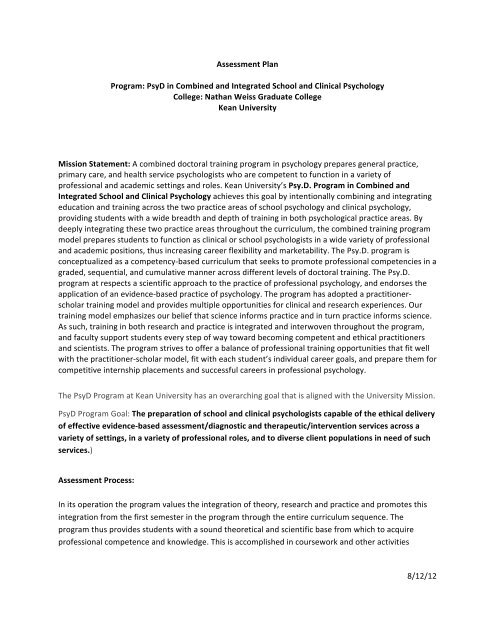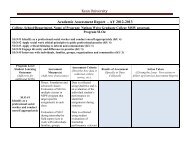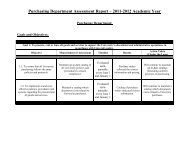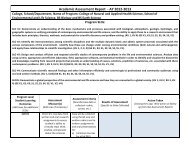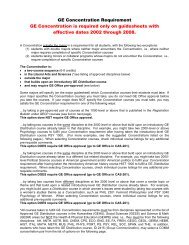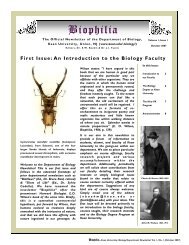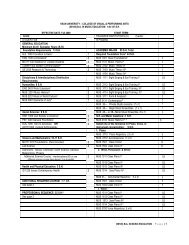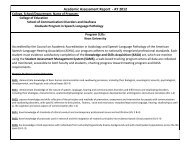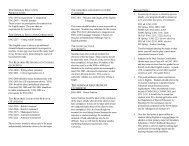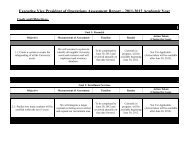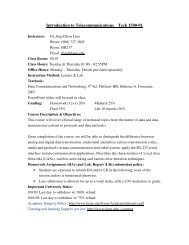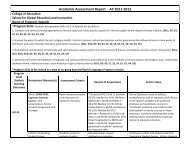8/12/12 Assessment Plan Program: PsyD in ... - Kean University
8/12/12 Assessment Plan Program: PsyD in ... - Kean University
8/12/12 Assessment Plan Program: PsyD in ... - Kean University
You also want an ePaper? Increase the reach of your titles
YUMPU automatically turns print PDFs into web optimized ePapers that Google loves.
<strong>Assessment</strong> <strong>Plan</strong> <br />
<strong>Program</strong>: <strong>PsyD</strong> <strong>in</strong> Comb<strong>in</strong>ed and Integrated School and Cl<strong>in</strong>ical Psychology <br />
College: Nathan Weiss Graduate College <br />
<strong>Kean</strong> <strong>University</strong> <br />
Mission Statement: A comb<strong>in</strong>ed doctoral tra<strong>in</strong><strong>in</strong>g program <strong>in</strong> psychology prepares general practice, <br />
primary care, and health service psychologists who are competent to function <strong>in</strong> a variety of <br />
professional and academic sett<strong>in</strong>gs and roles. <strong>Kean</strong> <strong>University</strong>’s Psy.D. <strong>Program</strong> <strong>in</strong> Comb<strong>in</strong>ed and <br />
Integrated School and Cl<strong>in</strong>ical Psychology achieves this goal by <strong>in</strong>tentionally comb<strong>in</strong><strong>in</strong>g and <strong>in</strong>tegrat<strong>in</strong>g <br />
education and tra<strong>in</strong><strong>in</strong>g across the two practice areas of school psychology and cl<strong>in</strong>ical psychology, <br />
provid<strong>in</strong>g students with a wide breadth and depth of tra<strong>in</strong><strong>in</strong>g <strong>in</strong> both psychological practice areas. By <br />
deeply <strong>in</strong>tegrat<strong>in</strong>g these two practice areas throughout the curriculum, the comb<strong>in</strong>ed tra<strong>in</strong><strong>in</strong>g program <br />
model prepares students to function as cl<strong>in</strong>ical or school psychologists <strong>in</strong> a wide variety of professional <br />
and academic positions, thus <strong>in</strong>creas<strong>in</strong>g career flexibility and marketability. The Psy.D. program is <br />
conceptualized as a competency-‐based curriculum that seeks to promote professional competencies <strong>in</strong> a <br />
graded, sequential, and cumulative manner across different levels of doctoral tra<strong>in</strong><strong>in</strong>g. The Psy.D. <br />
program at respects a scientific approach to the practice of professional psychology, and endorses the <br />
application of an evidence-‐based practice of psychology. The program has adopted a practitioner-scholar<br />
tra<strong>in</strong><strong>in</strong>g model and provides multiple opportunities for cl<strong>in</strong>ical and research experiences. Our <br />
tra<strong>in</strong><strong>in</strong>g model emphasizes our belief that science <strong>in</strong>forms practice and <strong>in</strong> turn practice <strong>in</strong>forms science. <br />
As such, tra<strong>in</strong><strong>in</strong>g <strong>in</strong> both research and practice is <strong>in</strong>tegrated and <strong>in</strong>terwoven throughout the program, <br />
and faculty support students every step of way toward becom<strong>in</strong>g competent and ethical practitioners <br />
and scientists. The program strives to offer a balance of professional tra<strong>in</strong><strong>in</strong>g opportunities that fit well <br />
with the practitioner-‐scholar model, fit with each student’s <strong>in</strong>dividual career goals, and prepare them for <br />
competitive <strong>in</strong>ternship placements and successful careers <strong>in</strong> professional psychology. <br />
The <strong>PsyD</strong> <strong>Program</strong> at <strong>Kean</strong> <strong>University</strong> has an overarch<strong>in</strong>g goal that is aligned with the <strong>University</strong> Mission. <br />
<strong>PsyD</strong> <strong>Program</strong> Goal: The preparation of school and cl<strong>in</strong>ical psychologists capable of the ethical delivery <br />
of effective evidence-‐based assessment/diagnostic and therapeutic/<strong>in</strong>tervention services across a <br />
variety of sett<strong>in</strong>gs, <strong>in</strong> a variety of professional roles, and to diverse client populations <strong>in</strong> need of such <br />
services.) <br />
<strong>Assessment</strong> Process: <br />
In its operation the program values the <strong>in</strong>tegration of theory, research and practice and promotes this <br />
<strong>in</strong>tegration from the first semester <strong>in</strong> the program through the entire curriculum sequence. The <br />
program thus provides students with a sound theoretical and scientific base from which to acquire <br />
professional competence and knowledge. This is accomplished <strong>in</strong> coursework and other activities <br />
<br />
8/<strong>12</strong>/<strong>12</strong>
through a critical exam<strong>in</strong>ation of basic psychological areas and methodologies. <br />
The <strong>PsyD</strong> <strong>Program</strong> is <strong>in</strong>tended to: <br />
• Prepare students to be knowledgeable consumers of research who recognize; a) the <br />
importance of science for the <strong>in</strong>formed and ethical practice of school and cl<strong>in</strong>ical <br />
psychology, and 2) the value of professional practice for the further development of the <br />
science of psychology. <br />
• Provide a mode of tra<strong>in</strong><strong>in</strong>g that recognizes the uncompromis<strong>in</strong>g value of ethically sensitive, <br />
culturally <strong>in</strong>formed and respectful professional practice. <br />
• Emphasize and develop a set of core competencies essential to effective school and cl<strong>in</strong>ical <br />
practice with diverse clients and <strong>in</strong> varied situations and sett<strong>in</strong>gs. <br />
• Provide sequential opportunities for students to apply their learn<strong>in</strong>g through skills courses <br />
and supervised practicum experiences <br />
Curriculum and Tra<strong>in</strong><strong>in</strong>g <strong>Plan</strong>: <br />
In order to fully comprehend, assess, and treat dysfunctional behavior and emotional states or to <br />
improve the performance and function<strong>in</strong>g of <strong>in</strong>dividuals or systems, it is first necessary to understand <br />
the essentials of functional human behavior. The foundations of knowledge <strong>in</strong> the diverse discipl<strong>in</strong>es of <br />
psychology provide the base for this broad understand<strong>in</strong>g. The curriculum provides for exposure to such <br />
foundational areas as developmental psychology, social psychology, cognitive psychology, emotion <br />
science, learn<strong>in</strong>g theory, and biopsychology. In addition, students are provided the necessary context by <br />
which they can appreciate the development and rich history of our field. Students are also provided <br />
exposure to the systems, foundations, and multidiscipl<strong>in</strong>ary nature of the educational system with<strong>in</strong> <br />
which children develop as function<strong>in</strong>g members of society. This base is the scientific foundation upon <br />
which cl<strong>in</strong>ical and scholarly pursuits of the contemporary school and cl<strong>in</strong>ical psychologist can and should <br />
occur. At the end of the first program year, students must successfully pass a comprehensive <br />
exam<strong>in</strong>ation that is modeled after the national licens<strong>in</strong>g exam for psychologists, and covers the <br />
foundational material covered <strong>in</strong> the first year curriculum. <br />
In our program, we conceptualize scientific <strong>in</strong>quiry as a systematic approach to generat<strong>in</strong>g, <br />
accumulat<strong>in</strong>g, and evaluat<strong>in</strong>g a body of empirical research, analyz<strong>in</strong>g and understand<strong>in</strong>g cl<strong>in</strong>ical <br />
situations, and as a methodology for the development of professional critical th<strong>in</strong>k<strong>in</strong>g. As such, scientific <br />
<strong>in</strong>quiry is seen as the foundation for systematic and empirically grounded (i.e. data-‐based) cl<strong>in</strong>ical <br />
decision-‐mak<strong>in</strong>g. Students develop the capacity to cont<strong>in</strong>ually evaluate the evolv<strong>in</strong>g scientific and <br />
theoretical literature and thus <strong>in</strong>form professional practice <strong>in</strong> an empirical manner, th<strong>in</strong>k systematically <br />
and critically about case material, and generate orig<strong>in</strong>al scholarly work that advances the profession of <br />
psychology. Students are therefore encouraged to become outcome oriented, to cont<strong>in</strong>uously consider <br />
evolv<strong>in</strong>g data, to weigh systematic evidence from a variety of sources, and to seek empirical validation <br />
for their psychological assessments, consultations and <strong>in</strong>terventions. In addition, these skills and abilities <br />
<br />
8/<strong>12</strong>/<strong>12</strong>
serve as the foundation for self-‐reflective lifelong learn<strong>in</strong>g and development as professional school and <br />
cl<strong>in</strong>ical psychologists. From the first semester of the program through the time students beg<strong>in</strong> <strong>in</strong>ternship <br />
they are part of faculty-‐led research teams. Each core faculty has his or her own research team, which <br />
engages <strong>in</strong> systematic empirical study of relevant topics <strong>in</strong> the field of school and cl<strong>in</strong>ical psychology. <br />
Students will be on two research teams <strong>in</strong> their first program year, and ultimately will choose at least <br />
one team of which they will be a regular and consistent member. Research teams are vertical teams that <br />
<strong>in</strong>corporate faculty research, student dissertation research, and student pre-‐dissertation research <br />
activities. Students and faculty of each team will meet weekly to engage <strong>in</strong> theoretical and empirical <br />
discussions; engage <strong>in</strong> research plann<strong>in</strong>g and implementation; analyze data; and prepare conference <br />
submissions/presentations and journal manuscripts. These research teams provide encouragement and <br />
support for scholarly activity, and allow students to learn first hand the ways <strong>in</strong> which research and <br />
practice can be and should be seamlessly <strong>in</strong>terwoven. The culm<strong>in</strong>ation of this skill development, and our <br />
fundamental assessment of student learn<strong>in</strong>g <strong>in</strong> this area is the doctoral dissertation, which must be <br />
completed prior to be<strong>in</strong>g conferred with the <strong>PsyD</strong>. <br />
The curriculum also provides students with a broad array of assessment, consultation and <strong>in</strong>tervention <br />
models <strong>in</strong> preparation for the general practice of school and cl<strong>in</strong>ical psychology. While the faculty <br />
emphasizes those assessment, consultation and <strong>in</strong>tervention models that have demonstrated empirical <br />
support, other theoretical models are presented and discussed. Students are encouraged to <br />
systematically exam<strong>in</strong>e alternatives, critically evaluate the applicability of theories, assessments, <br />
<strong>in</strong>terventions, and associated empirical literature, and apply these perspectives to a diversity of cl<strong>in</strong>ical <br />
and educational issues, populations, and sett<strong>in</strong>gs. This approach encourages students to develop an <br />
evaluation, consultation and <strong>in</strong>tervention style consistent with their own th<strong>in</strong>k<strong>in</strong>g yet grounded <strong>in</strong> the <br />
empirical tradition of professional psychology. As our primary mission is the education and tra<strong>in</strong><strong>in</strong>g of <br />
competent generalists capable of engag<strong>in</strong>g <strong>in</strong> the <strong>in</strong>dependent practice of school and cl<strong>in</strong>ical <br />
psychology, the ongo<strong>in</strong>g development of professional skills is a major focus of the <strong>Program</strong>. The <br />
development of core competencies <strong>in</strong> the professional relationship, assessment, <strong>in</strong>tervention, <br />
professional ethics, the appreciation for human diversity and its impact on professional practice, <br />
consultation/program evaluation, and supervision/ management are emphasized <strong>in</strong> the curriculum and <br />
evaluated regularly and systematically throughout the <strong>Program</strong>. Specifically, dur<strong>in</strong>g the second year <br />
students must submit and pass the <strong>Assessment</strong> Competency Exam (an extensive written case report), an <br />
Individualized Educational <strong>Plan</strong> Project, and a Positive Impact Project, all designed to <strong>in</strong>sure competency <br />
<strong>in</strong> psychological and pschoeducational assessment and <strong>in</strong>tervention plann<strong>in</strong>g. <br />
Necessary for the <strong>in</strong>tegration of theory, scientific <strong>in</strong>quiry and professional practice is the practicum <br />
sequence which is fully <strong>in</strong>tegrated <strong>in</strong>to our curriculum plan, beg<strong>in</strong>n<strong>in</strong>g <strong>in</strong> the first year of study with pre-practica<br />
experiences and sequentially cont<strong>in</strong>u<strong>in</strong>g over the next three levels of our <strong>Program</strong>. The pre-practica<br />
experience beg<strong>in</strong>s dur<strong>in</strong>g the fall, spr<strong>in</strong>g, and summer semesters of the first year with students <br />
ga<strong>in</strong><strong>in</strong>g experience <strong>in</strong> the adm<strong>in</strong>istration, scor<strong>in</strong>g and <strong>in</strong>terpretation of a variety of psychological and <br />
psychoeducational assessments at the <strong>Kean</strong> <strong>University</strong> Psychological Services (Tra<strong>in</strong><strong>in</strong>g Cl<strong>in</strong>ic). The pre-practicum<br />
experience also <strong>in</strong>cludes closely supervised experiences conduct<strong>in</strong>g psychological and <br />
<br />
8/<strong>12</strong>/<strong>12</strong>
psychoeducational assessments of tra<strong>in</strong><strong>in</strong>g cl<strong>in</strong>ic patients. The practicum sequence, <strong>in</strong>clud<strong>in</strong>g both <br />
external placements (externships) and an ongo<strong>in</strong>g Tra<strong>in</strong><strong>in</strong>g Cl<strong>in</strong>ic caseload, provides students with <br />
supervised cl<strong>in</strong>ical experiences that build upon their coursework to develop and ref<strong>in</strong>e professional <br />
competencies. The <strong>in</strong>tegration of health-‐care services between <strong>Kean</strong> <strong>University</strong>’s Psychology Tra<strong>in</strong><strong>in</strong>g <br />
Cl<strong>in</strong>ic, Student Counsel<strong>in</strong>g Center, Child Study Institute and Communication Disorders Center allows <br />
students to develop an appreciation of, and experience <strong>in</strong>, an <strong>in</strong>tegrated multidiscipl<strong>in</strong>ary health care <br />
delivery system. The practica also provide students with cl<strong>in</strong>ical material to enhance their critical <br />
th<strong>in</strong>k<strong>in</strong>g regard<strong>in</strong>g the application of theory, research, ethics, and issues of human diversity presented <strong>in</strong> <br />
courses and sem<strong>in</strong>ars. Supervision provided dur<strong>in</strong>g practica, <strong>in</strong>clud<strong>in</strong>g close faculty supervision of all <br />
Tra<strong>in</strong><strong>in</strong>g Cl<strong>in</strong>ic activities, is a critical factor <strong>in</strong> the development of cl<strong>in</strong>ical skills, provides additional <br />
practitioner-‐scientist models, and beg<strong>in</strong>s the development of students’ own consultation and <br />
supervisory skills. In comb<strong>in</strong>ation with on-‐site supervision, the program-‐based professional sem<strong>in</strong>ar <br />
allows the student to cont<strong>in</strong>ue development of case conceptualization, ethical awareness, sensitivity to <br />
issues of diversity and professional communication skills. The capstone of our cl<strong>in</strong>ical tra<strong>in</strong><strong>in</strong>g is the <br />
Internship, which is a one-‐year full time or two-‐year part time experience. <strong>Assessment</strong> of student cl<strong>in</strong>ical <br />
skill development occurs through practicum supervisor evaluations (completed 3 times per academic <br />
year), the Intervention Competency Exam, completed dur<strong>in</strong>g the third program year, and <strong>in</strong>ternship <br />
supervisory rat<strong>in</strong>gs completed twice dur<strong>in</strong>g the fifth and f<strong>in</strong>al program year.. <br />
In prepar<strong>in</strong>g school and cl<strong>in</strong>ical psychologists capable of the ethical delivery of <br />
effective evidence-‐based assessment/diagnostic and therapeutic/<strong>in</strong>tervention services <br />
across a variety of sett<strong>in</strong>gs, <strong>in</strong> a variety of professional roles, and to diverse client <br />
populations <strong>in</strong> need of such services, the follow<strong>in</strong>g Specific Learn<strong>in</strong>g Objectives (SLOs) <br />
are held: <br />
SLO1: The preparation of practitioners of school and cl<strong>in</strong>ical psychology who <br />
understand the scientific body of knowledge that serves as the foundation of <br />
practice <strong>in</strong> school and cl<strong>in</strong>ical psychology. Students will acquire and <br />
demonstrate knowledge of the follow<strong>in</strong>g core areas of the scientific foundations <br />
of psychology. <br />
• Learn<strong>in</strong>g, Personality and Individual Differences <br />
• Social Bases of Behavior <br />
• Cognitive-‐Affective Bases of Behavior <br />
• Developmental Bases of Behavior <br />
• Biological Bases of Behavior <br />
• History and Systems of Psychology <br />
• Psychopathology and Human Exceptionalities <br />
(KU 1-‐5; S 1-‐5) <br />
__________________________________________________________________________ <br />
Direct Measures: 1. Comprehensive Exam<strong>in</strong>ation (at end of first program year) <br />
2. Quiz averages <strong>in</strong> Biological Bases and History and Systems of Psychology (to beg<strong>in</strong> Spr<strong>in</strong>g 2013) <br />
<br />
8/<strong>12</strong>/<strong>12</strong>
Indirect Measure: 3. Graduat<strong>in</strong>g Student Survey (<strong>in</strong> 2011-‐20<strong>12</strong> report, this is Measure #2) <br />
SLO2: The preparation of practitioners of school and cl<strong>in</strong>ical psychology who <br />
demonstrate understand<strong>in</strong>g of and competency <strong>in</strong> core cl<strong>in</strong>ical skills essential <br />
for effective professional practice across sett<strong>in</strong>gs and populations. Students will <br />
acquire and demonstrate an understand<strong>in</strong>g of, and proficiency <strong>in</strong>, the follow<strong>in</strong>g <br />
Core Competencies as def<strong>in</strong>ed by the National Council of Schools and <strong>Program</strong>s <br />
of Professional Psychology (NCSPP) guidel<strong>in</strong>es: <br />
• The Professional Relationship <br />
• <strong>Assessment</strong> <br />
• Intervention <br />
(KU 1-‐5; S 1-‐5) <br />
Direct Measures: 1. <strong>Assessment</strong> Competency Exam (dur<strong>in</strong>g second program year); 2. Response to <br />
Intervention Project (completed dur<strong>in</strong>g the second program year); 3. Individualized Educational <strong>Plan</strong> <br />
(completed dur<strong>in</strong>g the second program year); 4. Intervention Competency Exam (completed dur<strong>in</strong>g the <br />
third program year); 5.Practicum and Internship supervisory rat<strong>in</strong>gs of cl<strong>in</strong>ical skills (completed <br />
throughout program years 2-‐5) <br />
Indirect Measure: 6. Graduat<strong>in</strong>g Student Survey <br />
• Diversity <strong>in</strong> Cl<strong>in</strong>ical Practice <br />
• Professional Ethics <br />
(KU 1-‐5; S 1-‐5) <br />
SLO3: The preparation of practitioners of school and cl<strong>in</strong>ical psychology who <br />
demonstrate understand<strong>in</strong>g of and competency <strong>in</strong> professional standards and <br />
ethics as well as the impact and importance of issues of cultural and <strong>in</strong>dividual <br />
diversity on professional practice. Students will acquire and demonstrate an <br />
understand<strong>in</strong>g of, and proficiency <strong>in</strong>, the follow<strong>in</strong>g Core Competencies as <br />
def<strong>in</strong>ed by NCSPP guidel<strong>in</strong>es: <br />
Direct Measures: 1. Professional Ethics and Diversity sections of the <strong>Assessment</strong> and Intervention <br />
Competency Exams and 2.Practicum and Internship supervisory rat<strong>in</strong>gs (specific to ethics and diversity). <br />
Indirect Measures: 3. Ethics sem<strong>in</strong>ar and Diversity sem<strong>in</strong>ar grades and 4. Graduat<strong>in</strong>g Student Survey <br />
SLO 4: The preparation of practitioners of school and cl<strong>in</strong>ical psychology who <br />
demonstrate understand<strong>in</strong>g of, and competency <strong>in</strong>, emerg<strong>in</strong>g and expanded <br />
roles for the professional psychologist <strong>in</strong> a wide range of multidiscipl<strong>in</strong>ary <br />
systems. Students will acquire and demonstrate an understand<strong>in</strong>g of, and <br />
proficiency <strong>in</strong>, the follow<strong>in</strong>g Core Competencies as def<strong>in</strong>ed by NCSPP guidel<strong>in</strong>es: <br />
• Consultation and <strong>Program</strong> Evaluation <br />
• Supervision and Management <br />
(KU 1-‐5; S 1-‐5) <br />
<br />
8/<strong>12</strong>/<strong>12</strong>
Direct Measures: Successful completion of 1. <strong>Program</strong> Evaluation Project; and 2. Supervision Project (<strong>in</strong> <br />
the fourth program year). <br />
Indirect Measures: 3. Graduat<strong>in</strong>g Student Survey <br />
SLO 5: The preparation of practitioners of school and cl<strong>in</strong>ical psychology able to contribute to and <br />
effectively utilize the exist<strong>in</strong>g body of knowledge and empirical f<strong>in</strong>d<strong>in</strong>gs <strong>in</strong> the science of psychology, to <br />
<strong>in</strong>form and enhance the applications of school and cl<strong>in</strong>ical psychology and to view the professional <br />
practice of school and cl<strong>in</strong>ical psychology as requir<strong>in</strong>g life-‐long learn<strong>in</strong>g. Students will acquire and <br />
demonstrate proficiency <strong>in</strong> research and evaluation/scientific <strong>in</strong>quiry as well as attitudes and behaviors <br />
necessary for lifetime learn<strong>in</strong>g. <br />
(KU 1-‐5; S 1-‐5) <br />
Direct Measures: 1. Research productivity through conference presentations and publications (dur<strong>in</strong>g <br />
the first four years of the program); and, 2. the Doctoral Dissertation to be completed prior to conferral <br />
of degree) <strong>in</strong> most cases dur<strong>in</strong>g the fifth program year). <br />
Indirect Measure: 3. Graduat<strong>in</strong>g Student Survey <br />
<br />
8/<strong>12</strong>/<strong>12</strong>


